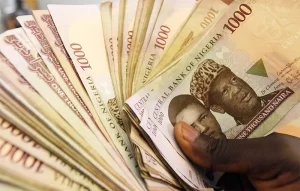Table of Contents
The official exchange rate between the naira and the dollar closed at N1,534/$1 on the NAFEM market on Monday, February 12th, 2024, marking the weakest point the naira has ever reached against the dollar at the official market’s closing.


The intraday high and low also touched N1,550 and N1,000 against the dollar, respectively, as Nigeria undergoes economic challenges amid central bank reforms aimed at transitioning to a free-market exchange rate.

Join our Telegram Channel for Updates
The forex turnover for the day was $89 million, the lowest in February so far. On the parallel market, where the exchange rate is unofficially traded, BDC operators quoted rates ranging between N1,490 to N1,550.
The Nigerian naira experienced an unprecedented decline, hitting an all-time low of N1,534.39 per dollar on Monday, accompanied by a significant 64.69% drop in forex turnover to $89.61 million. This 4.19% decrease from Friday’s closing rate of N1,469.97 raises concerns about the currency’s trajectory and highlights the severity of the current economic challenges.
Despite recent interventions by the Central Bank of Nigeria (CBN) to strengthen the foreign exchange market, the downward trend of the currency persists, raising concerns about its potential impact on the broader economy. This development is likely to exacerbate existing inflationary pressures and place additional strain on household budgets, especially for those relying on imported goods.
The implications for businesses, both large and small, are also substantial, with potential increases in production costs and challenges in maintaining profitability. The domestic currency depreciated by 64.42% to close at N1,534.39 to a dollar at the close of business, based on data from the officially traded NAFEM window.
The intraday high was recorded at N1,550/$1, while the intraday low was N1,000/$1, reflecting a wide spread of N550/$1. Forex turnover at the close of trading was $89.61 million, indicating a 64.69% decrease compared to the previous day.
In the parallel forex market, where forex is sold unofficially, the naira depreciated marginally, with an exchange rate quoted at N1,490/$1, a 0.34% decrease compared to the previous day’s rate of N1,485. The Great British Pound (GBP) appreciated marginally by 0.27% to close at £1/N1,885, while the naira gained against the Euro by 0.63%, closing at N1575/EUR1 against the previous day’s N1585/EUR1.
In the cryptocurrency market, where forex is traded using stablecoins, the naira crossed N1,506.65/$1.
Financial experts, including Mr. Olatunde Amolegbe, the former President and Chairman Governing Council of the Chartered Institute of Stockbrokers (CIS) and the Managing Director of Arthur Steven Asset Management Limited, emphasize the importance of market and participant confidence for exchange rate stability.
Amolegbe suggests that while the current efforts of the CBN may positively impact market confidence, the desired effects might manifest in the medium term rather than the short run. He also emphasizes the need for structural changes to encourage import substitution, such as improved security, better infrastructure, increased foreign direct investments, and support for local production.









